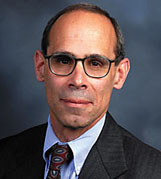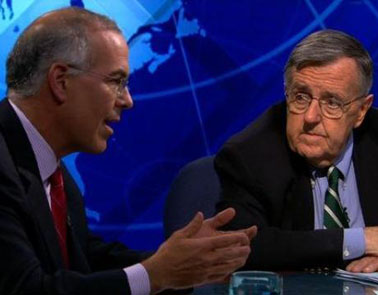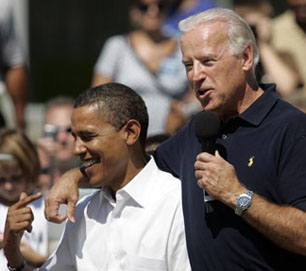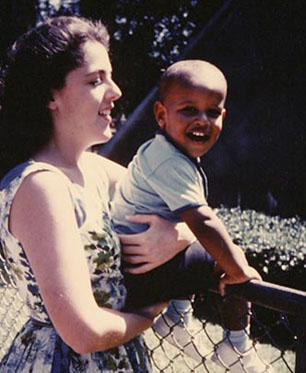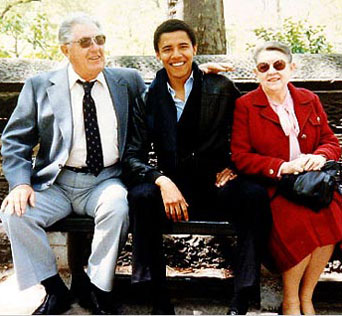Why I think President Barack Obama is the biggest thing that’s happened in American history in my lifetime
Sep 9th, 2012 | By Randall White | Category: In Brief
True romance: photo of Manhattan couple kissing as they are handcuffed by police “on graffiti charges” – something about Mo Gelber’s potential prize-winning photo here seems to capture the mood of the USA today in the late summer of 2012?
You can’t deny that a lot of people these days are disappointed in US President Barack Obama – including some who really were enthused about him four years ago. I personally have friends, in both the United States and in Canada, where I live myself, who have told me they feel this way.
It is also all too easy to document similar feelings from a wide array of pundits and commentators. In the 5 July 2012 issue of the London Review of Books, the Yale University Sterling Professor of English, David Bromwich, offered a provocative “Diary” piece, which the LRB editors billed on the front cover under the heading “A Bad President.”
Bromwich’s piece began with: “I went to see Barack Obama speak in New York, in spring 2007, at a preliminary ‘sounding’ for donors and assorted others. This was a few weeks after he announced his candidacy, and the audience of a hundred or so, in a spacious Upper West Side apartment, were brought in close enough to let everyone have a glimpse … What struck me was his proficiency at blending in. Yet his sense of crisis was impersonal and oddly minimal. A woman with a worried look said afterwards: ‘I’m not sure he’s what we need.’”
Much more recently, Clint Eastwood, in the wake of his “Old Man and the Seat” performance at the 2012 Republican National Convention, clarified his position, for anyone who may still be in doubt: “President Obama is the greatest hoax ever perpetrated on the American people.”
Even up here in Canada, where President Obama is still much more popular than our current Canadian prime minister Stephen Harper, the Globe and Mail columnist Margaret Wente (who moved to Toronto from Evanston, Illinois when she was 14) has confessed that : “Back in 2008, I was among Barack Obama’s biggest fans … Today, the love affair is over. If I were voting in this election, I don’t know what I’d do.”
Still more recently, in the Toronto Star, Tony Burman, “former head of Al Jazeera English and CBC News” who now “teaches journalism at Ryerson University,” published a column called “Why Obama should lose the election, and why he won’t.” Mr Burman offered four reasons why, by all rights, President Obama ought to be defeated this coming November 6: “1. He lost sight of why he was elected” ; “2. He squandered his first two years” ; “3. The American economy is in the tank” ; and “4. The American people still want change.”
In something of a similar vein, late this past Thursday night the (usually) reasonable US conservative David Brooks wrote on the New York Times website that : “In short, [big] change is still the issue,” and the focus of President Obama’s “solid but not extraordinary speech” at the Democratic National Convention was just “incremental improvement.” The speech showed his “character and his potential.” But it “didn’t show audacity and the fulfillment of that potential.”
In a similar vein again, on Friday night, on the PBS News Hour, Brooks “completely” agreed with his balanced liberal counterpart Mark Shields that, in the 2012 presidential race at the moment, Barack Obama is “defying political gravity.” No president, Shields stressed, has been re-elected with economic numbers as bad as they are now in the USA “since Franklin Roosevelt in the Great Depression.” Based on all more recent historical evidence, in an economy this bad “Obama should be 10 points behind.” Instead “he’s tied or ahead.” And as even the conservative David Brooks went on, so far Obama has had at least a better polling bounce out of the Democratic Convention than Romney had out of its Republican predecessor. Go figure!
What if nothing but time can finally heal what ails the American economy today?
The more I think about it myself, I don’t really have such a hard time understanding the slight edge President Obama seems to have right now, despite the recurrent bleak economic news. What I still have trouble understanding is how the Romney-Ryan Republicans are doing as well as they are – even allowing that a lot of voters do seem to (quite mistakenly?) believe Mitt Romney’s business career gives him something of an edge on economic issues.
For one thing, four years after the Great Recession financial panic of 2008, most national economies in most parts of the world are still struggling, in one respect or another.
The economic ailments from which the United States (like many other places) is suffering are not as bad as during the 1930s Great Depression. But the tenacity of these ailments (as Mark Shields implies) does seem to have some kind of unique precedent in the American Age of Franklin Delano Roosevelt. And, as many people my age were taught in high school (assuming we were listening, of course), it finally took the Second World War to cure the Great Depression.
Even some current Obama critics with English degrees like Margaret Wente grasp this point, even if it does not finally seem decisive to them. “Yes” (she writes) President Obama was “dealt a rotten hand” by both the Bush-Cheney team and the global economy. And she goes on: “Maybe no one could have done better than he’s done. Probably the economy would be bad no matter what. Maybe the evil Republicans are entirely to blame for refusing to strike a budget deal.”
This weekend the Globe and Mail in Toronto ran an article on similar themes, called “With no rebound in sight, there’s never been a slump like this.” The article urged that : “Normal – if that means the 15-year boom that preceded the financial crisis of 2008 –Â may never return. ‘The most likely scenario is that we are stuck in low gear,’ says John Allison, the former chief executive officer of BB&T Corp., America’s 13th-biggest bank by assets, and a distinguished professor at Wake Forest University’s business school.”

Kristen Wiig, looking surprisingly hot at the Toronto International Film Festival, September 2012, despite the troubled economy. What and who will she be voting for on November 6? And will Clint Eastwood approve?
I overheard similar nervous talk a few weeks ago, at a bar on the edge of the Toronto financial district called The Bottom Line, with hot waitresses and high prices. And. If you ponder the history of such things at all seriously, it did take a very long time to get out of the Great Depression of the 1930s.
What we are living through now is, again and happily enough, not quite so bad. (Perhaps partly because, even in the United States, we do have social programs we did not have then, to offset the wilder depredations of the dynamic free-market economy – as in the California value investor Charles Brandes’ memorable mantra : “The markets are very inefficient and manic-depressive. And wrong a lot.”)
But it is not unreasonable to see some instructive parallels between now and the dirty 1930s. And it at least seems quite plausible right now to suspect that in the United States (and other places, ultimately including Canada) we just might remain “stuck in low gear” – economically at any rate – for some considerable time to come.
The still unassailable high ground of the first African American president
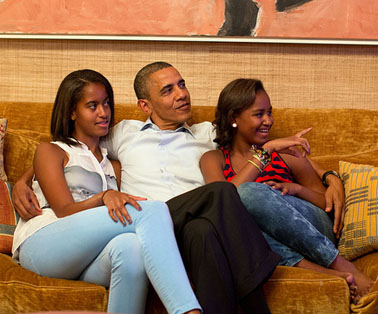
The president and his daughters watch Michelle Obama speak at the Democratic National Convention in Charlotte on TV, from the Treaty Room of the White House, Tuesday night, Sept. 4, 2012. (Official White House Photo by Pete Souza).
If you do think that much of the world economy will be in trouble for quite a while yet, your idea of just who would likely be the best president of the United States right now could easily enough gravitate towards a figure like Barack Obama, whose fundamental humanity in hard times almost certainly has more depth than his raw business and/or strictly “economic” experience.
(And, on these same assumptions, what real good is Mitt Romney’s business experience, if what’s wrong with the economy can be effectively cured only by a long enough stretch of healing time – to say nothing of the various aspects of what Romney-Ryan appears to have in mind, that could actually make the economic state of the great majority of the nation a lot worse!)
To me, however, President Obama’s continuing appeal in our time goes considerably deeper than any of this. Tony Burman writes that “Barack Obama’s 2008 election was historic for reasons other than his race. Obama won by the largest margin for a non-incumbent since 1952. The driving motivation was a desire for ‘change’ after eight years of conservative Republican rule.”
The other night, watching the Democratic National Convention on TV, I found myself going still farther, as I blurted out to my wife (even if she wasn’t really listening, and who can blame her, 0f course, etc, etc) that I thought the election of Barack Obama as president of the United States was the biggest thing that has happened in American history in my lifetime. And I at any rate have lately been trying to figure out just what I meant when I said this – which, I want to underline very boldly, I certainly do believe, in the unexamined pit of my stomach, and far beyond.
As Tony Burman notes, it isn’t just that Barack Obama is the first African American president of the United States. But that is nonetheless a very big consideration, I think. When you listen to Billie Holiday’s classic recording of the profoundly sad and powerfully moving anthem about lynching in the good old days of the American South, “Strange Fruit” – made back in 1939, during the Great Depression era of Franklin D. Roosevelt – you can recover something of just how marvellous it is that, not quite 70 years later, a man whose father at least was from Africa, was actually elected to the highest office in the land : “From California to the New York Island.”

US first lady Michelle Obama smiles as she arrives to address delegates during the first session of the Democratic National Convention in Charlotte, North Carolina, September 4, 2012. (Photo : Reuters).
The American people ennobled themselves and their country enormously when they first elected President Obama in 2008 – because he was the first African American to reach these heights. My guess is that many especially middle-of-the-road or centrist voters understood and still understand this very well. It was a great step forward, in the long struggle to integrate the tragic odyssey of black African slavery into the authentic real-world folkways of freedom and democracy in America, and the real battlegrounds of American progress today.
To now deny President Obama a second term, just because, like every other American president in history, from George Washington to Abraham Lincoln to FDR to George W. Bush, he finally proved unable to walk on water – as he probably did once seem to imply he could. – would be both a travesty of justice and, at the same time, a gigantic political miscalculation.
Democracy in America put its historic best foot forward in 2008. Its best chance for a continuing dynamic future in a quite dramatically changing global village is to just continue walking along this same high road, even if so many oh-so-obvious rough patches still lie ahead.
And what if President Obama really has already begun to build a new 21st century majority for a still greater American future?
I do agree with Tony Burman that, in the very end, what is just possibly most remarkably historic about Barack Obama is not just “his race” – and/or what the lovely Melissa Harris-Perry on MSNBC has so persuasively drawn attention to as his kinky (or curly?) African-American hair.
Mr Burman came a little closer to the deepest crux of things, I think, at the end of his Toronto Star column yesterday on “Why Obama should lose the election, and why he won’t.”
He concluded with : “In America’s largely conservative media, reinforced by the country’s business elite, the conventional wisdom endures that the US is a ‘centre-right nation’ inherently opposed to any progressive change. But there is no evidence to sustain it. Yes, polls indicate that self-described conservatives in the US outnumber self-described liberals … But more Americans also describe themselves as ‘Democrats’ than ‘Republicans,’ and on most social and economic issues, moderate positions are favoured by most Americans … As the US population becomes more Hispanic and diverse, and the Republicans retreat further into America’s shrinking ‘white tribe,’ the smart money is on the Democrats.”
Yet to me (and others from the wider North American white tribe like me, I know) the most provocative prospect about President Obama goes still further. It is almost presciently hinted at in David Bromwich’s London Review of Books “Diary” piece from this past July – even if Mr Bromwich finally chooses to regard it as more of a weakness than a strength.
Bromwich begins by noting that : “One reward of David Maraniss’s [recent and intriguingly revealing] biography of Obama’s first 27 years is that it confirms a hunch about Obama’s self-invention.” And this strand in Bromwich’s analysis concludes with: “Obama decided when young to offset the anxieties of mixed identity by seeing himself as a lucky convergence of opposite forces and tendencies: ‘Caught without a class, a structure, or tradition to support me, in a sense the choice to take a different path is made for me… . The only way to assuage my feelings of isolation is to absorb all the traditions [and all the] classes; make them mine, me theirs.’ So the stranger and outsider becomes in America the axial personality through whom all the cross-currents of national character must flow. It is a telling fantasy. As president of the United States, Obama has felt that his role is to reflect the presence of all points of view and to reject none. He finally becomes a fighter, or rather, talks in the tones of a fighter, when he can subject the most nebulous of foes to a stern rebuke. He is against selfishness, against ‘what is not best in us’ and so on.”
Bromwich certainly does see Obama’s “axial personality through whom all the cross-currents of national character must flow” as “a telling fantasy” – which in the end virtually summarizes the Achilles’ heel, that has made Barack Obama such a disappointment during his first four years in office. (Or, as Clint Eastwood has explained, from a somewhat different but not entirely dissimilar point of view: “President Obama is the greatest hoax ever perpetrated on the American people.”) Yet what most impressed me about the 2012 Democratic National Convention in Charlotte, North Carolina, which ended this past Thursday, was how it seemed to show the constructive beginnings of a new broader American political culture, that really does embrace and personify “all the cross-currents of national character” in an emerging new USA today.
It is still very early days in this kind of potential new American prospect, of course. The “race” between Obama-Biden and Romney-Ryan is still very close. And it is still quite possible – if not exactly probable – that Romney and Ryan, in the midst of their “retreat further into America’s shrinking ‘white tribe,’” will finally win on November 6. (And even if Obama does win the presidency, the Democrats’ chances in especially the House but even the Senate still seem far less than quietly assured, or even all that good, to say the very least.)
Yet it remains the case that President Barack Obama is not just an African American. As the photo of him as a young man with his maternal grandparents in the 2012 Convention video underlined, he is also himself a member in biological good standing of the old “white tribe.” As David Maraniss’s recent biography shows so nicely, by finally marrying Michelle LaVaughn Robinson (a very shrewd move on several fronts, as Bill Clinton stressed this past Wednesday night), Barack Obama at last embraced the only main identity American mass culture will still allow anyone who is even just partly visibly “black”. Up to the point “ in his late twenties” when (as David Bromwich explains) “[h]is public character seems to have begun to correspond to the fictive persona,” Barry Obama’s girlfriends were mostly “white.”
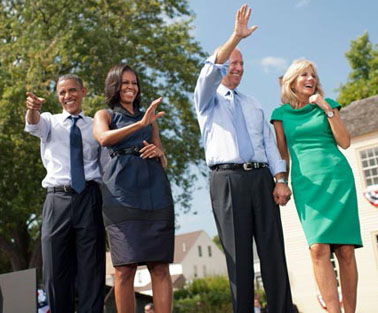
After officially accepting their nomination at the convention in Charlotte, President Obama and Vice President Biden were back on the road, along with Michelle Obama and Dr. Jill Biden. Their first stop was in Portsmouth, New Hampshire.
Along some similar channel, to me one of the most impressive things about the Thursday night finale of the 2012 Democratic Convention in Charlotte, North Carolina was how, just watching on TV, you could see by the looks on Michelle Obama’s face just how much warm affection she has for the white man Vice President Joe Biden, and his wife Dr. Jill Biden.
The camera dwelled on her face when the Bidens got up to speak, of course. And you could say all this was part of some cynical plot. But I don’t think you can finally just simulate what her face and her body language told us.
Clint Eastwood (to his further ultimate shame, as far as I’m concerned) thinks Joe Biden is just a joke. But that just shows how foolish Clint Eastwood is politically (like another great American poet perhaps, Ezra Pound from Idaho, who finally died at the Civil Hospital of Venice, Italy in 1972, at the age of 87).
Yet whatever else has happened over the past four years in Washington, DC, Michelle and Barack Obama have become very good and warm friends with Jill and Joe Biden. President Obama himself underlined this point this past Friday, on the campaign trail in New Hampshire (whose compelling state motto is “Live free or die”), when he explained how Joe Biden was not only the best vice president he could possibly have but, more importantly, a very good friend.
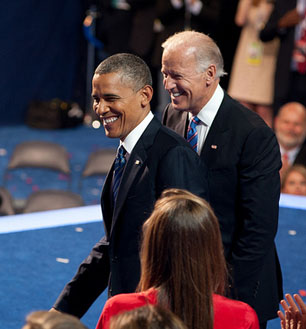
Barack Obama and Joe Biden at the Democratic National Convention – Charlotte, North Carolina, September 6, 2012.
And the final note I want to leave my meanderings here on, for the time being, is just how encouraging it is, for ordinary people in North America like me, to suddenly realize that, in the midst of all the sordid truths that seem to define politics almost everywhere in the rising global village today, to learn that, deep in the heart of the sordid depths of Washington, DC the black Obamas and the white Bidens have become very good friends, who lean on and nourish each other, in all the inevitable struggles that define their lives.
In the last four years President Obama has indeed shown that he too cannot walk on water. No mere human being can. But, as far as I’m concerned, in the past four years Michelle and Barack and Jill and Joe have shown that there also are indeed, even in the late great Gore Vidal’s United States of America today, at least a few good reasons to, as the Rev. Jesse Jackson used to say some years ago now, “keep hope alive.”
And, unlike Margaret Wente, if I were going to be voting in the election on November 6, I would have no trouble at all deciding just who I was going to vote for!
(Even or especially if it is true that, when the time finally came to more or less officially celebrate the vast sprawling compromise that is Barack Obama’s US health care reform act, Joe Biden told the president, almost or more in earshot of the sordid and cynical Washington press gallery, that, whatever else, “this is a big fuckin’ deal!”)
Randall White was born in 1945 in Toronto, Canada, where he still lives and works. He is a former public servant in Canada’s most populous province of Ontario and, among other things, the author of Ontario 1610—1985 : A Political and Economic History ; Fur Trade to Free Trade : Putting the Canada-US Trade Agreement in Historical Perspective ; Ontario Since 1985 ; and (with the artist Michael J. Seward), On the Road in the GTA : An eclectic guide to the exurban sprawl of Greater Toronto.
